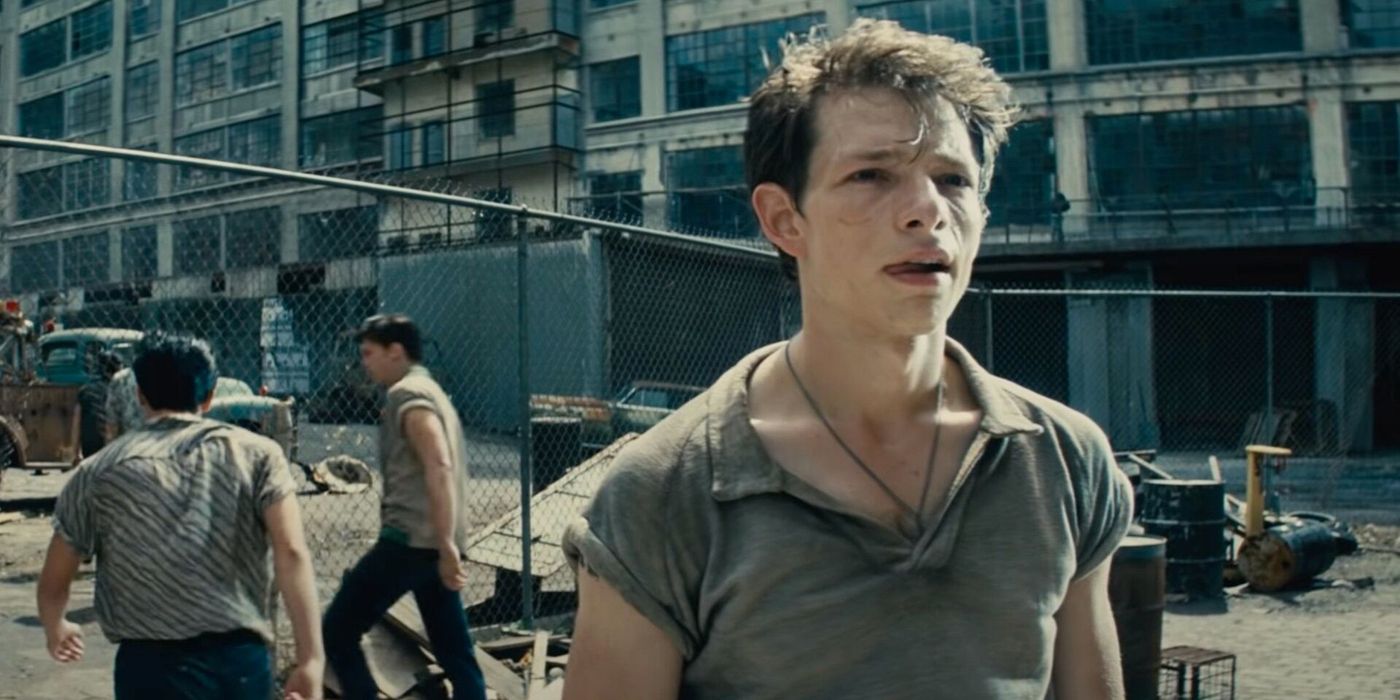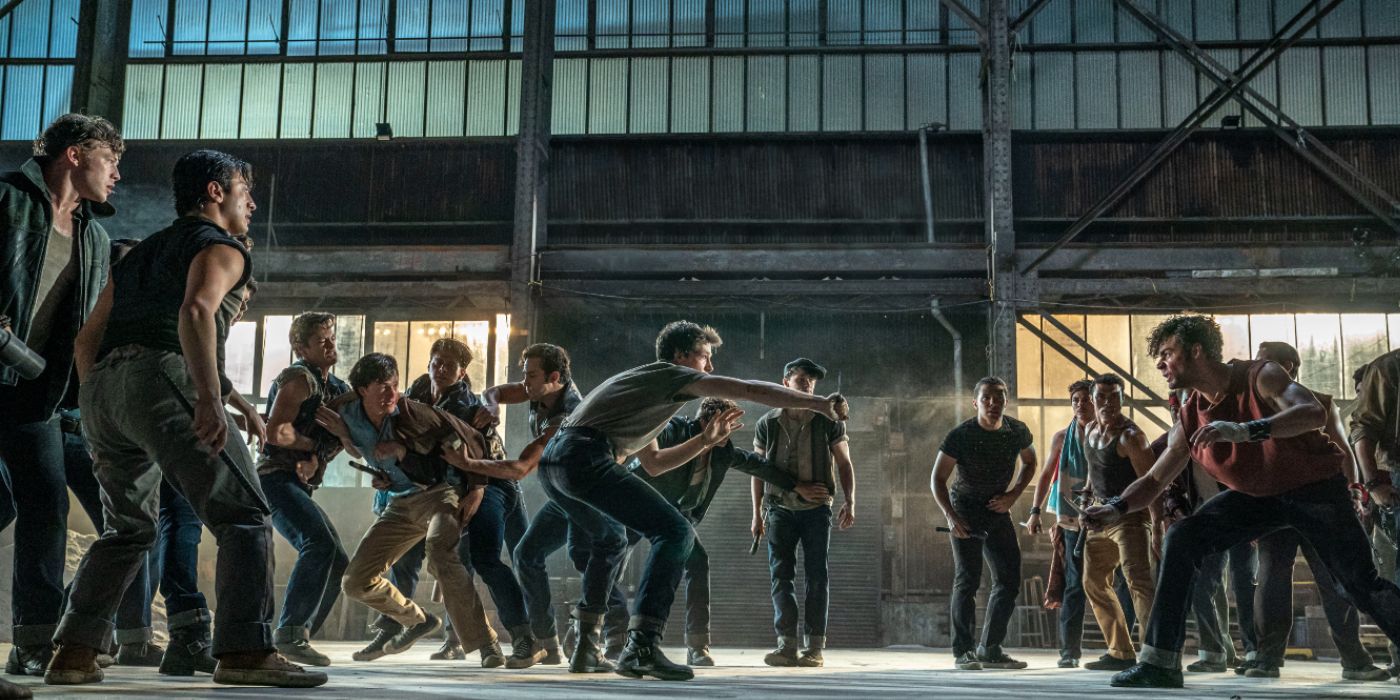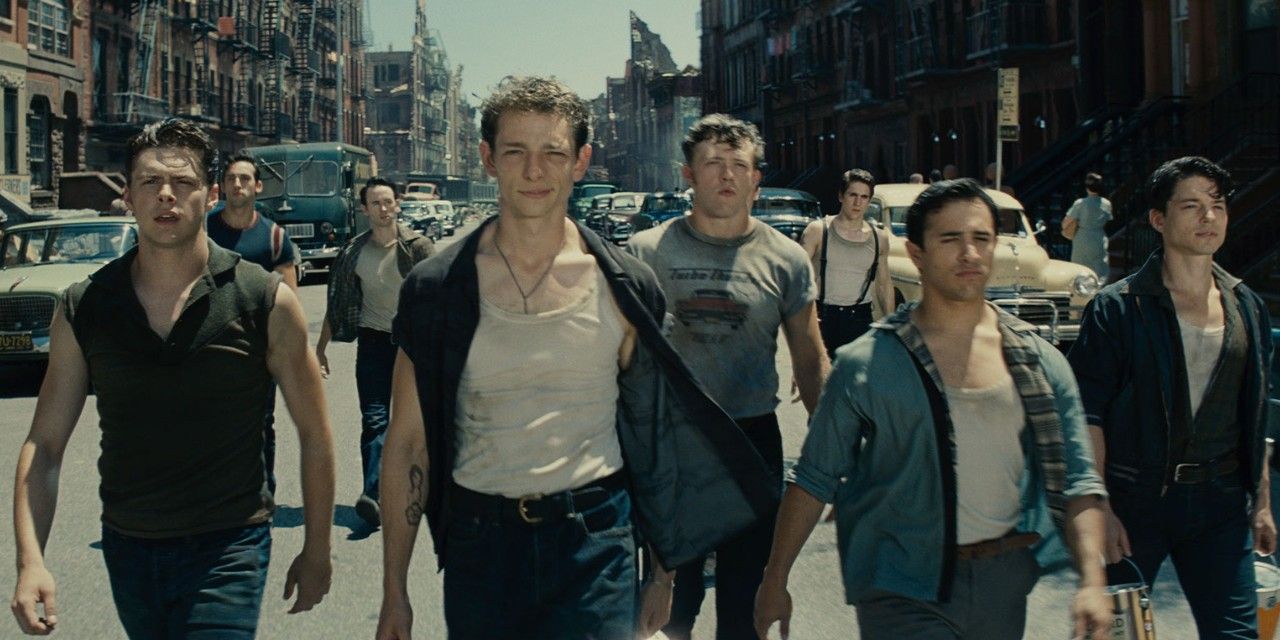Steven Spielberg's West Side Story tells the classic story of star-crossed lovers Maria (Rachel Zegler) and Tony (Ansel Elgort) for a new generation. The film stays true to the spirit of the original while adding a few updates. The film opened in theaters on December 10 to critical acclaim.
Mike Faist plays Jets leader and Tony's best friend Riff in the new adaption. The actor spoke to Screen Rant about his long process to get the role, the intense choreography, and the questions he had for the legendary Spielberg.
Screen Rant: You are fantastic in this movie, just a total standout. I've seen it twice now, it's even better the second time. The reception is fantastic. What does that feel like?
Mike Faist: Well, I don't know specifics, because I tell people I can't really read into that stuff, more like self-preservation, good or bad, but overall I hear it's going well and people like it. And I think what it is honestly, for us making the film was a very genuinely a wonderful experience. And it did come from a place of love, making the film, and so, the fact that it is being not just well-received, but I think, that energy is coming across the film and I think people are receiving that.
It's just affirming, that, one we're not crazy. That experience was magical for us and that is coming across, and it's lovely. I mean, it's everything you could hope for.
You can feel it watching it, somebody said this and I think, it's the most accurate thing is, "I don't feel like I'm watching actors in a movie, I just feel like I'm watching these people exist in this world." You really get immersed in it.
Mike Faist: Wow. That's wonderful. Wow.
To back it all the way up, when did you first hear they were recreating West Side Story, and how did your audition process begin?
Mike Faist: Okay, this is how I found out that they were doing it. I was doing Dear Evan Hansen off-Broadway, in New York and Michael Greif, who's the director of that, he's very good friends with Tony Kushner. And I think this was maybe previews or something, and Tony had come to see the show and came backstage, and we were introduced and Michael had said, "Oh, he is working on the new West Side Story." And I was like, "Oh, that's crazy. Cool. Well, best of luck." And that was really it. And that was at this point, five years ago, maybe, something like that. And then, gosh, maybe longer, I don't even know that might have been six years ago now at this point.
It’s been a journey.
Mike Faist: That might have been a very long time ago. And I was leaving the show now and Cindy Tolan's office called me in to audition. I think my first tape was in February of 2018, and they called me back in June, July to do another tape. And finally, it was November, and I was doing an off-Broadway play at the time, and they were saying, "Hey, come on in and read for Steven." And I just remember doing the play and going back, going to work that night, and telling my castmates, “I get to audition in front of Steven Spielberg tomorrow.”
I was very excited about that, I wasn't thinking like, "Oh, I'm going to book this thing." I was like, "Oh, I get to audition in front of the man himself, I'm very much looking forward to that." And I had met Steven once before, he had come backstage for Dear Evan Hansen when we were on Broadway and he was lovely. He made a joke about loving A Ghost Story, with that show and me. But it was, honestly, the whole time, it wasn't ever something that I had thought was going to come to fruition.
It sounds like he had you in mind.
Mike Faist: Well, maybe I don't know. I think it's honestly one of those things I keep saying, I think we as a cast, especially the theater people owe Cindy Tolan a big favor for that because we're not movie stars. I keep using the term, we’re blue-collar theater actors. I think it's interesting that Steven went with theater actors to portray these roles and do that. And personally, I owe Cindy the props in terms of making sure that we were all on his radar.

I saw this quote yesterday from Spielberg. I think it was with Entertainment Tonight where he said he was considering delaying the movie just so that you could begin it.
Mike Faist: Yeah, there were potentially some complications. So, I had shot a pilot at the time and we didn't know whether or not the pilot was going to get picked up. And I remember at that audition, after reading, he said, "Mike why don't you stick around a little bit?" And he pulled his chair up right next to me. And he said, "So, what's the deal with this pilot?" I'm like, "I don't know. I have no idea what's going to happen with it. We just got done shooting it. And I don't know if it's going to get picked up." He looked at me and was searching in my eyes. I think he was trying to see whether or not I was lying to him but I was like, "I genuinely don't know."
And later, he told me that he was advised to not quote “fall in love with me” because I wasn't going to be available. And it was this kind of back and forth for months really - from November, and then I was shooting a film in February in Atlantic City, and I got a call on a Friday from my agent saying, "They want you in rehearsal on Monday." And so that was it. And that's what started my rehearsal process. All of a sudden, I was just in rehearsals for this thing. It was happening.
I interviewed Steven Spielberg for the first time when I was in my early 20s. I was so nervous. He starts walking towards me. I'm like, "Come on Ash, you can do this, you can do this." And then as soon as he starts talking to you, it's like all the nerves just go away because he's just down to earth and easy to talk to. What was your experience like being in his orbit?
Mike Faist: It is a little nerve-wracking at first.
And then he just disarms you.
Mike Faist: Yeah. Well, he's so giving. He's so giving with his energy, and I think very loving, and just kind of a wonderful person, and has no ego about him whatsoever at the end. I think everything that he does comes from a genuine place of love, and there's something just so wonderful and infectious about that. I remember starting that rehearsal process kind of guarded, and removed and back, and he's just so open that you can't help but let your guard down and want to bask in that energy. He's wonderful. He's a wonderful guy.
I feel like I'd be like, "Okay, I'm going to be professional." And then a little bit in, I'd be like, "Okay, so Indiana Jones."
Mike Faist: Yeah, totally though, that's absolutely the case. Day two of shooting, I asked him, I was like, "Okay, you got to tell me, come on, give me the dirt, tell me the stories.” Because at the end of the day, he's just a big nerd about this stuff too. He loves doing it and he loves telling those stories too because they are special experiences.
He is a nerd. I remember asking him, "What's your favorite John William score?" He was like, "Star Wars." And I was like, "Oh, not even your movie."
Mike Faist: No, for sure, 100... At the end of the day, he just loves this. And it's so genuine. There's nothing else about it. And he just wants to share that. He's wonderful.
So, what did you ask him?
Mike Faist: Day two. I asked him about the scene in Raiders where Harrison Ford is supposed to fight this guy with the twirling sword. And he just pulls his gun out and shoots him. And I was like, "You got to tell me." Because there's that famous story. And so, he told me that it was the night before and Harrison had come down with food poisoning and kind of told Steven, "I can only give you an hour because I am sick." And Steven jokingly kind of said, "An hour? What do you want to do? Just pull your gun out and shoot the guy?" And he said, "That's kind of what I was thinking."
And then he did this great Harrison Ford impression I'll never forget because Steven was really nervous about Indiana Jones killing a man. He said, "I don't know, do you think we could get away with it?" And he did this thing. He did jazz hands. And he is like, "It's only a movie." And seeing Steven Spielberg doing an impersonation of Harrison Ford was really awesome.

I need a Get Back-style documentary about West Side Story just so we can get all the stories.
Mike Faist: I think there's going to be one. I think there is going to be a West Side documentary coming.
Oh really? So, they were filming around you guys and stuff?
Mike Faist: The entire process. I hope I'm not spoiling anything, but he said it at the premiere. So, I just assume it's out there.
Did you have any moment like that with Riff where you kind of alter something that he was supposed to do or anything that you can think of?
Mike Faist: I think what it was, working and shooting on the film, it really was just a collaborative kind of thing. It was a give and take where I'd come up with something and from what Tony brought and then Steven would add a layer to that. We just played.
We just kind of kept doing this thing and he was really open to that and he welcomed it, and he wanted that. I think someone else in his position wanting to tell this story, in particular, would want to hold on more, would want to not be so giving with the reins because of insecurities or nerves or whatever, but he was fully let go and let us play, which allowed him to play. And we just did this really wonderful thing.
You're no stranger to intricate choreography, but in this one, there are some very specific things I was watching where I'm like, "Oh my gosh." Like the "Cool" choreography. I was like, "How did they even pull this off?" What was that like? Was that as tough as it looked?
Mike Faist: Yes, it was, it really was. Ansel and I were in rehearsals for that for four months. And I hadn't danced in 10 years. I kind of gave that all up and said, "I don't really..."
We got in shape is what we did. And that was really, one, Justin [Peck's] choreography is so well thought out and beautiful, a beautiful homage to Jerry Robbins and also great in terms of propelling the story forward. He did a wonderful job and then his whole team really did a better job in terms of making Ansel and I look good and getting us into shape because it took a lot of work to get us into shape.
We were in ballet class every morning with the rest of the company who are very giving and cheering us on to get better and do our best and support us. And I mean, we did a lot in order to get to at least where we ended up, I'm sure we maybe could have done a little bit better if we both had more time or whatever, but it was a process for sure, to get us into shape, to be able to pull that stuff off.

Just going from the stage to the screen, what would you say is the biggest adjustment that you had to make?
Mike Faist: It was not much of one truthfully, it's the same game, just a different playground. I think the biggest thing is that when you're doing a show eight times a week, you go home and you think about what you did and you're like, "Well, okay, well, I get to try this again tomorrow. So, that's okay. I get to try it again tomorrow." It's more like with film, it's cut, moving on. That's it. You're like, "Oh gosh. All right. Well, I guess that's it." So, it is that practice of letting go and just kind of accepting and being like, "Yeah, that's it, that's it."
Can you watch yourself on screen?
Mike Faist: Not really. No one likes to do it. People talk, or however about actors watching themselves, but no, no one likes to watch themselves Come on.
It's extremely difficult. You can't help, but pick apart yourself.
If you weren't an actor, what do you think you would be doing?
Mike Faist: I’d be screwed, that's what I'd be doing. I'd be really screwed.
from ScreenRant - Feed https://ift.tt/3e0bZtK


0 Comments